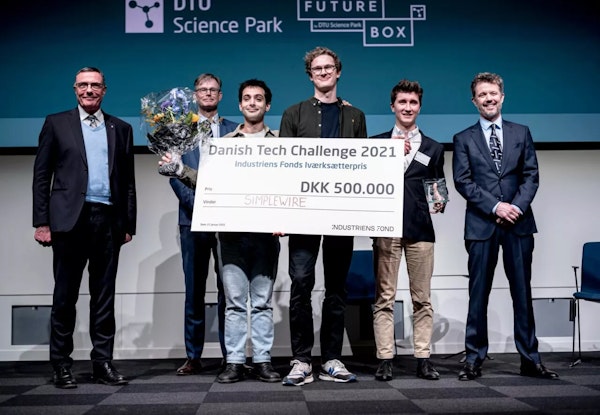We are looking for you who we can expand our team with and will help further develop our products.
What is Simplewire?
Simplewire is a startup with its roots in DTU. In Simplewire we're creating a hardware product that will digitise electrical installations in large buildings. This will replace the current method of using stickers and labels to match outlets, sockets cables ect. with the breaker it is attached to. Our vision is to be the go-to solution for electrical tagging.
What are your tasks?
Rather uniquely for an intership application, we have multiple bigger task that you can choose between. You therefore don't have to be able to solve all of the following task, but chose one or two of them if you believe they could be fun to work on during your internship.
Gain Read / Distance measurement of wireless signal
Intro
Our wireless scanner picks up a signal that lives on 230V installation cables. By measuring the amplitude of this signal captured in the scanner, it will be possible to determine the distance to the wire from which the signal originates.
Task
Tweaking an existing analog signal chain, performing experimental measurements and implementing the code for translating an amplitude to a distance in millimeters.
Competences
Primarily C / C ++ embedded programming, secondary analog electronics design (basic understanding).
Suitable for
Internship
Production test design
Intro
Our system consists of three individual components. Each of these components needs to be tested before shipping them to customers.
Task
Designing one or more of our production tests, with possibility of working with analog and digital aspects, as well as the mechanical setup. Bonus task: Setting up a framework for logging and displaying the results on linux servers.
Competences
Either/Or C / C ++ embedded programming/analog electronics design/mechanical design
Suitable for
Internship, bachelor or master thesis
Digital Front-end
Intro
Our wireless scanner picks up a signal that lives on 230V installation cables. Right now, the wireless front-end is purely analog. To improve the reception, and to enable easier development of the signal processing, we’re looking to implement a high speed ADC to record the signal, and demodulate it on an ESP32.
Task
Find a suitable ADC IC to be interfaced with an ESP32, and build a small proof of concept design
Competences: Primarily C / C ++ embedded programming, ESP32 interfacing, ADC knowledge, analog design.
Suitable for
Bachelor or master thesis
Exploration of modulation techniques
Intro
Our system communicates via on-off keying modulation. Many other more sophisticated modulation techniques exists, and could be a lot more beneficial for our product to use.
Task
Explore other suitable modulation techniques and implement a proof of concept design.
Competences
Primarily C / C ++ embedded programming, secondary analog electronics design
Suitable for
Bachelor or master thesis
Power measurement circuit and / or data collection system
Intro
Our system is installed on top of a breaker, and all power consumed by the breakers consumers, also run through our router module. This power needs to be measured and the measurement transmitted to a central database.
Task
Design and implement proof of concept design of a power measurement circuit and / or design the logging circuit and program of the data.
Competences
C / C ++ embedded programming, analog electronics design, data structures and database design.
Suitable for
Bachelor or master thesis
Other general competences?
Outgoing and flexible personality.
Good time management and organisational skills as well as high attention to details.
Whether or not you speak Danish does not matter, however you need to be fluent in spoken and written English.
Criteria
Whether or not you speak Danish does not matter, however you need to be fluent in spoken and written English.
You live in Denmark and is able to commute to our office on Frederiksberg.
What do we expect from our cooperation?
You are able to work autonomously but are also prepared to be part of an innovative environment in our small office on Frederiksberg. You are cheerful, supportive, helpful, creative, talented and when needed a nerdish simplewire-team member.
You will have good opportunities to form your working day as it suits you best - working hours are flexible and most of them will be spent on Frederiksberg.
What will we offer you?
We will offer you an internship which you will have the influence to shape in many different ways. There’ll be interesting and exciting tasks, tasks were you will have a big impact on how it should develop and be formed. Last but not least we’re offering you to be a part of a dynamic and enthusiastic team where we work together - and naturally we offer free lunch and a desk ;)
Who are we?
We are a team of three enthusiastic engineers with very different skillsets. Dennis has experience as an IC developer, Peter as an advisor in the building industry and Sasha as a project manager. None of us think that electrical tagging systems are sexy, but we burn for the potential that we believe this idea has.
When do you start?
The internship will start either in August or in September. Which one of the two is up to you and your university. The internship should preferably last 20 weeks, but more or less can also be acceptable.
We’re looking forward to reading your application.
Kind regards the Simplewire team
Perks and benefits
This job comes with several perks and benefits
Free lunch
Flexible working hours
Free coffee / tea
Free office snacks
Social gatherings
Near public transit
Working at
Simplewire
